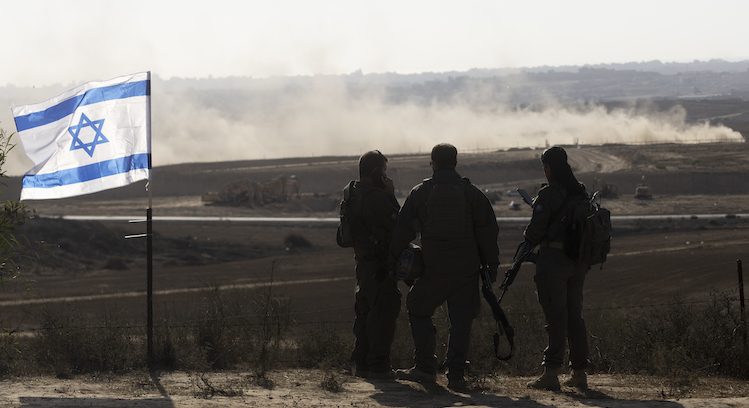The dominos have begun to fall regarding the recognition of Palestinian statehood. It’s time for the U.S. and Israel to make sure they have a strategy for dealing with the next two months of diplomatic pressure and the potential fallout.
The good news is that the Trump administration’s initial instincts seem to be fairly on-target, which is a helpful first step.
To review the past few days: Emmanuel Macron announced France would recognize the “state of Palestine” at September’s UN General Assembly in New York. UK Prime Minister Keir Starmer then followed, saying that unless Israel met certain conditions—including a cease-fire that Starmer and Macron helped sabotage—Britain will join France in once again redrawing the Middle East in ways that make everyone unhappy. Then Canadian Prime Minister Mark Carney joined the chorus with a bizarre statement claiming the Palestinian Authority had made certain commitments, such as “not militarizing the state of Palestine,” and that’s enough for him.
Also Malta said it would recognize Palestine, but obviously nobody cares.
Promises of recognition will have no practical effect on the conflict outside of encouraging Hamas to keep the rest of the hostages and to stop negotiating for peace. The hostage families are furious, and rightly so: This is a chilling betrayal by supposed democracies.
The Trump administration’s initial responses seem to convey the right idea: The president criticized the announcements and even signaled that they could become stumbling blocks in U.S. relations with the countries behind them. More significantly, the administration sanctioned the Palestinian Authority and the PLO.
The central point of the peace process and its attendant agreements is that a final-status settlement must come through negotiations. The Palestinians are therefore in clear violation of this obligation by courting support for unilateral declarations of statehood. The State Department added that the Palestinians are also “continuing to support terrorism including incitement and glorification of violence (especially in textbooks), and providing payments and benefits in support of terrorism to Palestinian terrorists and their families.” Therefore, PA and PLO officials will be subject to visa sanctions. “It is in our national security interests to impose consequences and hold the PLO and PA accountable for not complying with their commitments and undermining the prospects for peace.”
This is exactly right, but there still remains the question of what Israel should do. The Jewish state can react in one of two ways: Officials can treat the announcements as irrelevant and act as though they never happened, or they can take steps to insulate their citizens from the potential security fallout that France, the UK, and Canada are intent on unleashing.
The case for the former option rests on the belief that Israel can repair its diplomatic relations with the countries recognizing Palestine. Turn the other cheek, goes this logic, and the row won’t escalate.
The problem with this line of thinking is that it assumes these Western countries don’t want to escalate the situation. By all accounts they do, and if Israel lets them just swing away, they won’t hesitate to do so the next time. Another downside to turning the other cheek is that the “recognizers” are basing their treatment of Israel on the behavior of Hamas and other terror groups in Gaza. They have therefore created a situation in which Israel cannot successfully persuade them of its good intentions, because Israel’s intentions don’t ultimately matter to the UK, France, or Canada.
Israel would therefore be better served matching Europe’s unilateral actions with its own. If Gaza is going to be part of a state according to ye olde colonial powers, Israel must do what it can to shape that state.
That might include another serious push to cancel the 200-shekel note or make other changes that would dramatically lower the value of Hamas’s cash reserves. The flooding of Gaza with aid means there will be plenty of food, and direct monetary aid to Gazans is more likely to take the form of electronic payments than cash. Israel can boost Gazans’ purchasing power while reducing Hamas’s.
In terms of redeployment, the IDF should hold any strategic pass or point for the foreseeable future unless Hamas comes back to the table for a hostage deal and Israel has the opportunity to bring more hostages home. And Israel should be clear that it’ll be happy to leave Gaza when Hamas does. This accords with the Europeans’ insistence that their statehood recognition won’t further empower Hamas. In other words, Israel should anoint itself monitor on behalf of the Europeans. If this supposed Palestinian state is to be demilitarized, then Israel will decide if and when that demand has been met.
Israel might also want to think about setting terms that would incentivize a negotiated settlement over unilateral declaration. Since a Palestinian unilateral declaration would be illegitimate, Israel couldn’t possibly agree to dismantle existing Jewish communities in Judea and Samaria just because their Palestinian neighbors declare it their land. A negotiated settlement can be the only path to such concessions. Of course for that to happen, the Europeans will have to stop chasing the Palestinians away from the negotiating table. I won’t hold my breath.

















